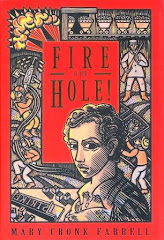
PUTTING A FACE ON IRAN.
PHOTO CAPTION: Middle Schooler I met in Kerman, Iran. Girls asked their American and UK visitors in English, "Which would be better to study, electrical or mechanical engineering?"
A treat for me at ALA was an opportunity to speak with Greg Mortenson, co-author of Three Cups of Tea, and a mountaineer from Montana who built over fifty schools for women and girls in war torn and earthquake ridden villages of Afghanistan and Pakistan. I had not read his book, but have heard about his development work in this region from others who had met him. His lecture and slide show inspired me and I was thrilled to hear that a YA edition is forthcoming. It will help bring a humanistic view of this part of the world to young people, who are faced with primarily negative images of the Middle East in our mainstream media. Perhaps it will also encourage young readers to make a contribution of this nature to the world. Many schools are helping Greg through Pennies for Peace. /www.penniesforpeace.org/home.html
When I spoke with Greg, I thanked him for sharing with the audience Iran’s positive role in his work in Pakistan. During his talk Greg explained that in order to build schools in northern Pakistan, he needed permission of Iranian clerics, the Supreme Leaders, whom the local Shi’a mullas looked to for guidance. When word finally came, he was invited into the Imam Bara Mosque where he sat among eight members of the Council of Mullahs, who had gathered there to read the dispatch from Qom, Iran. “Dear Compassionate of the Poor,” it began, “our holy Koran tells us all children should receive education, including our daughters and sisters…you have our permission, blessings and prayers.”
So often during the talks I have given on Iran, the setting of my novel Anahita’s Woven Riddle, I am asked if women in Iran are permitted to work, drive cars or go to school. The answer is yes to all of these. Many hold advanced degrees and they work in every sector of society. I have been told that they are better represented in government than women in the U.S. The young women I met in Iran who lived in orphanages, attended middle schools or universities spoke more than one language, many knew two or three.
Thank you, Greg, for your good deeds, good words, good thoughts.
~~Meghan Nuttall Sayres











